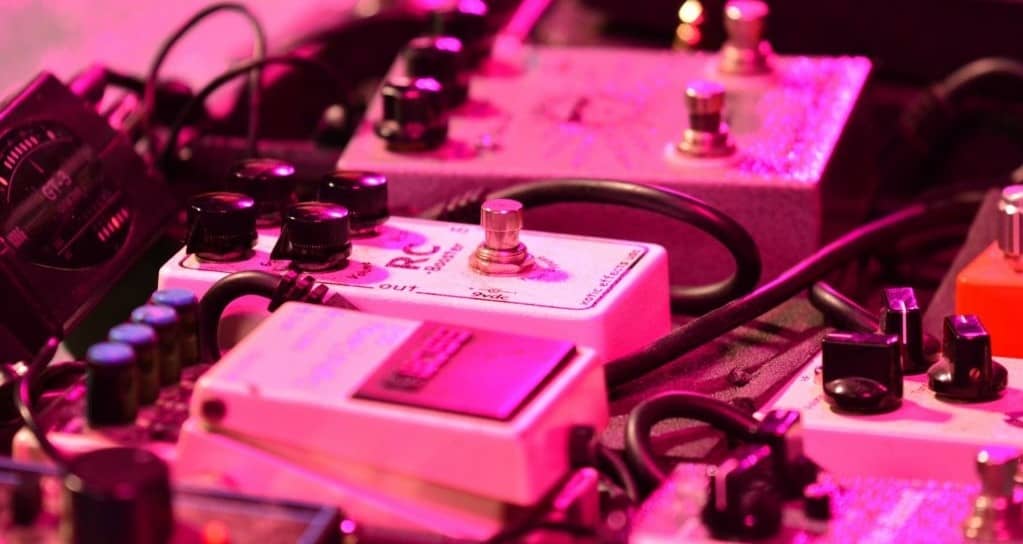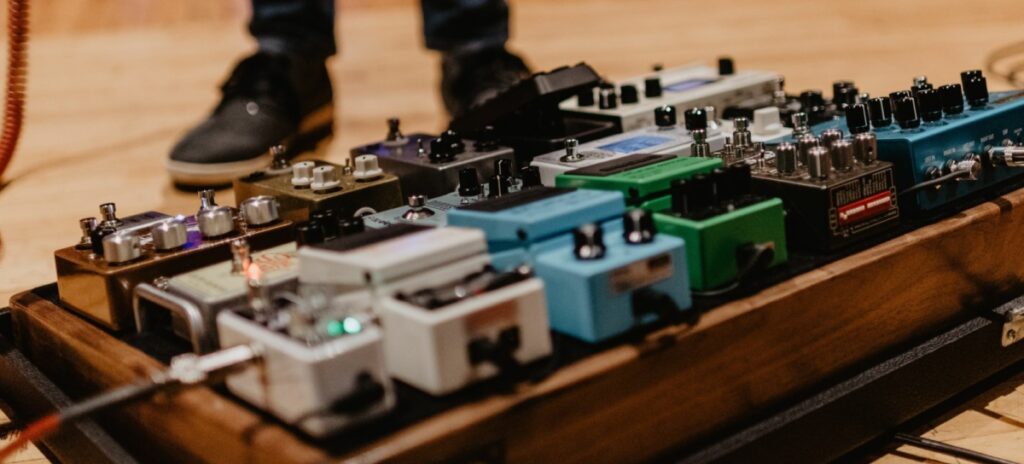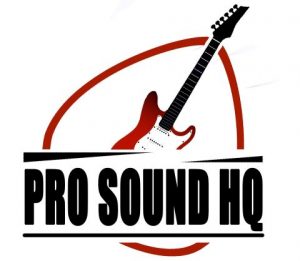If you’re struggling for room on your pedalboard then you might be looking at mini pedals as a way to save space. But do they sound the same as the full-size versions? Are they the best option? In this article I’ll take you through the pros and cons of mini and full-size pedals, and compare specific versions towards the end of the article so you can make the right decision.
Most mini guitar pedals sound identical to the full-size versions, the main difference is that mini pedals are roughly 2/3 of the size, and usually cannot be powered with 9V batteries. Some mini pedals have the same controls, but they are usually a lot smaller and more difficult to see.

Sound
In a lot of cases, there is no difference in tone or volume between the mini and full-size version of a pedal. Take the Ibanez TS808 Tube Screamer and the TS Mini Tube Screamer as an example. These two pedals use the same circuitry and as a result sound identical to one another.
Here are some examples of pedals which sound the same when comparing the mini and full-size versions:
- Ibanez TS808 Tube Screamer and TS Mini
- ProCo RAT2 and Lil’ Rat
- Dunlop JHF1 Hendrix Fuzz Face and Fuzz Face Mini
- Wampler Ego and Ego Mini
- TC Electronic Flashback 2 and Mini
In some cases though, the mini pedal might sound different from the full-size version. This is because some of the circuitry may need to be sacrificed in order to house everything in a smaller enclosure.
Functionality
With mini pedals you can lose a little bit of functionality in comparison to the full-size versions. This can mean a few things:
- Fewer controls
- Smaller control knobs
- Smaller stomp switch
Some mini pedals have identical controls compared to the full-size versions. Examples include the Ibanez Tube Screamer, Dunlop Fuzz Face and ProCo Rat.
Images link to Amazon
However, some pedals have fewer controls, such as the Keeley Compressor. The full-size Keeley Compressor Plus has 4 controls (sustain, level, blend, tone) as well as a single coil/ humbucker switch, whereas the mini just has two controls (level and compression) which limits the functionality considerably.
Images link to Amazon
Another point to make is that the actual control knobs on mini-pedals are usually considerably smaller than their full-size counterparts (particularly if they have the same number of controls). This can make it really tricky to see what the dials are set to unless you get up close and personal with the pedal.
In some cases, the stomp switch is also smaller on mini pedals, making them more difficult to activate and deactivate.
Power Supply
One of the big advantages of using full-size pedals over mini versions, is that you can use an internal 9V battery. With most mini pedals, there’s no room for an internal battery so you need to either use your pedalboard’s built-in supply, an AC adapter, or a DC power brick.
There are some exceptions to this though, such as the Dunlop Fuzz Face and Cry Baby Mini that can fit a 9V battery.
Check out my article on pedal power supply options to learn more.
It’s also worth noting that not every full-size pedal will take an internal 9V or 18V battery. Some pedals (reverb for example), are very power hungry so a lot manufacturers don’t both putting a space for a battery inside them as it will only last a few hours and isn’t a practical way of powering them.
| Power Supply | Full-Size Pedals | Mini Pedals |
| DC Power Brick | ✓ | ✓ |
| AC Adapter | ✓ | ✓ |
| Pedalboard | ✓ | ✓ |
| 9V Battery | ✓ | ✖ |
Size
One of the main benefits of mini pedals over full-size versions is of course that they are significantly smaller. This helps you to save space if you’ve got a cramped pedalboard or want to store a lot of pedals and are struggling for room.
With mini size pedals, you usually save about 1″-1.5″ in length, and 1″ in width compared to full-size pedals.
Here is a table showing the dimensions of popular full-size and mini effects pedals.
| Pedal | Full-Size Version | Mini Version |
| Ibanez Tube Screamer | 4.9″ x 2.8″ | 3.5 x 1.6” |
| Keeley Compressor | 4.4” x 2.4” | 3.7 x 1.8” |
| Dunlop FFM6 Fuzz Face | 8.0” x 7.3” | 3.5 x 3.5” |
| Dunlop Cry Baby | 10.0” x 4.0” | 5.2” x 3.0” |
| TC Electronic PolyTune3 | 4.8” x 2.8” | 3.7” x 2.0” |
| ProCo Rat | 3.5” x 3.1” | 3.3” x 2.0” |
If you are concerned about space, check out these two articles for more help:

Price
In general, mini pedals are around $20-$30 cheaper than the full-size versions, however there are exceptions to this.
In some cases, the pedals are the same price, and sometimes the mini versions are slightly more expensive (usually only by around $10). This is usually when the pedals use the same circuitry and have the same controls, so the only difference is the casing size. In which case, you may pay a premium for the space-saving advantage of a mini pedal.
Here is a table comparing the price of full-size and mini versions of popular electric guitar effects pedals.
| Pedal | Full-Size Pedal | Mini Pedal |
| Ibanez Tube Screamer | $110 | $80 |
| Keeley Compressor | $150 | $130 |
| Dunlop FFM6 Fuzz Face | $170 | $150 |
| Dunlop Cry Baby | $170 | $120 |
| TC Electronic PolyTune3 | $100 | $100 |
| ProCo Rat | $80 | $90 |
Popular Pedals Compared to Their Mini Versions
Now we’ve been through the overview, I wanted to directly compare some mini and full-size versions of popular pedals. Here are the ones I’ll be talking about:
- Ibanez Tube Screamer
- Jim Dunlop Germanium Fuzz Face
- Dunlop Cry Baby
- Keeley Compressor
Ibanez Tube Screamer TS808 vs Mini
The Ibanez TS808 and TS Mini use the same controls and have the same circuitry so sound identical to one another.
| Specification | Ibanez TS808 | Ibanez TS Mini |
| Controls | Overdrive, level, tone | Overdrive, level, tone |
| Length | 4.9” | 3.5” |
| Width | 2.8” | 1.6” |
| Average Price | $180 | $80 |
The main advantages of the TS808 over the Mini, is that you can use a 9V battery to power it, and the controls are larger and much easier to see.
Here is a link to the pedals on Guitar Center:
There is also a third version of the Tube Screamer, the TS9, which sounds different compared to the mini and TS808, but sits in between them in terms of price.
Here is a link to my comparison between the TS808, TS9 and TS Mini.
Jim Dunlop Fuzz Face vs Mini
The Jim Dunlop Germanium Fuzz Face and Mini Germanium Fuzz Face sound identical and have the same controls. The Mini has an LED light (unlike the full-size version) and can be powered by a 9V battery unlike most mini pedals.
| Specification | Germanium Fuzz Face | Germanium Fuzz Face Mini |
| Controls | Volume, fuzz | Volume, fuzz |
| Length | 8.0″ | 3.5″ |
| Width | 7.3″ | 3.5″ |
| Average Price | $170 | $150 |
Here is a link to the pedals on Guitar Center:
Dunlop Cry Baby vs Mini
The full-size and mini versions of the Dunlop Cry Baby sound the same. The main differences are that the Mini is significantly smaller (about half the length), and has a slightly steeper pedal angle. Both pedals can be powered using a 9V battery.
| Specification | Cry Baby | Cry Bay Mini |
| Length | 10″ | 5.2″ |
| Width | 4″ | 3.0″ |
| Average Price | $170 | $120 |
Here is a link to the pedals on Guitar Center:
Keeley Compressor
The full-size Keeley Compressor Plus has 4 controls (sustain, level, blend, tone) as well as a single coil/ humbucker switch, whereas the mini just has two controls (level and compression) which limits the functionality considerably.
The main benefit of the Mini version is that it saves space on a pedalboard. However, it cannot be powered with a 9V battery like the full-size version can.
| Specification | Keeley Compressor Plus | Keeley Compressor Mini |
| Controls | Sustain, level, blend, tone | Level, compression |
| Length | 4.4” | 3.7” |
| Width | 2.4” | 1.8” |
| Average Price | $150 | $130 |
Here is a link to the pedals on Guitar Center:
Check out my complete guide to building the perfect pedalboard.




